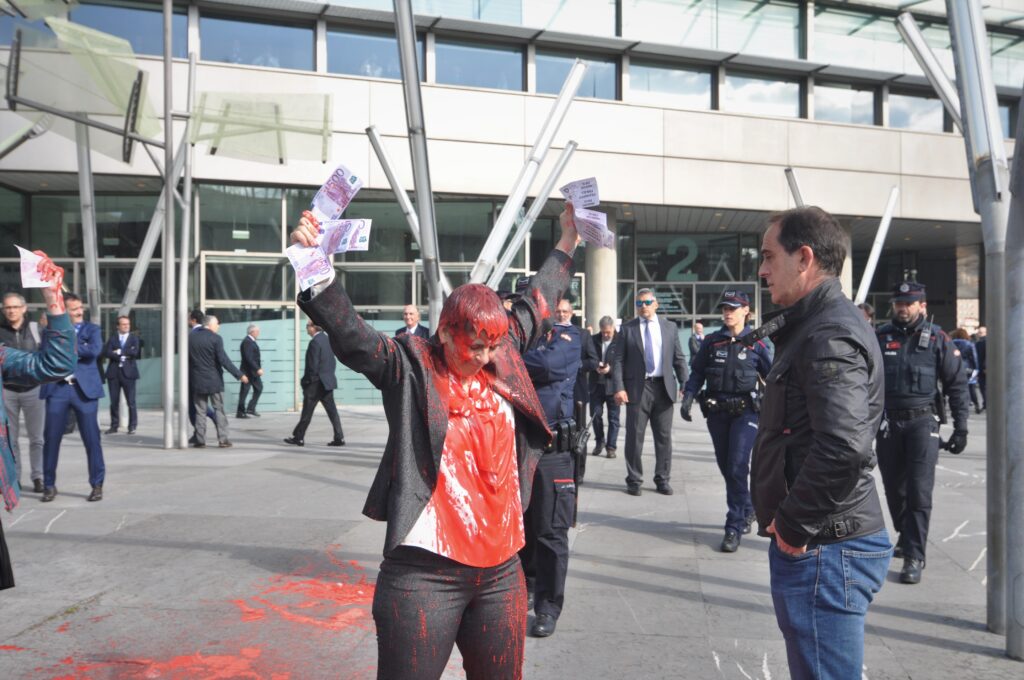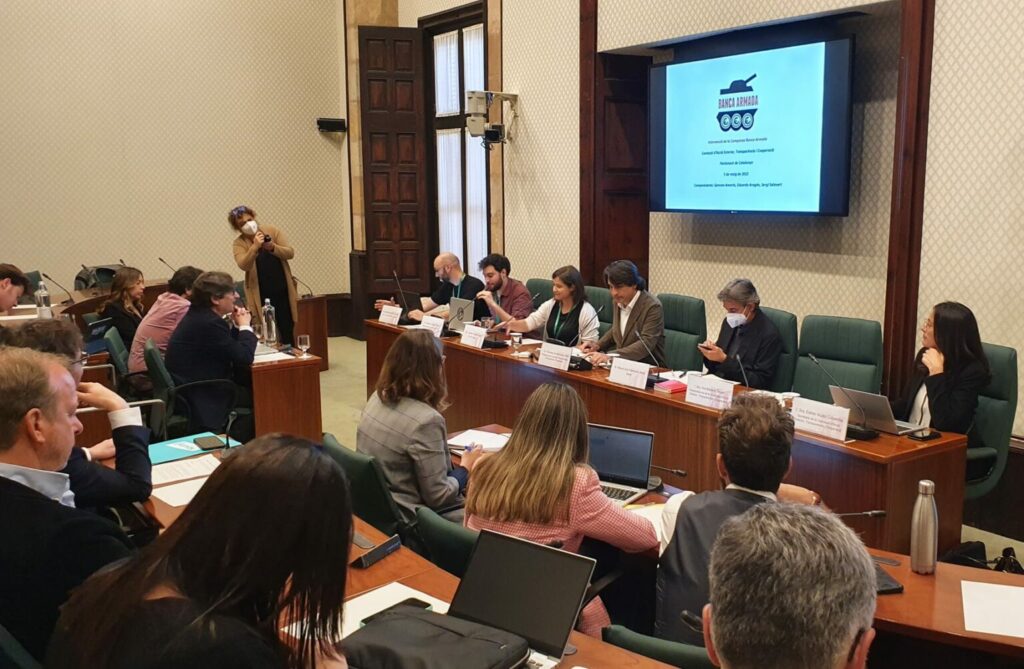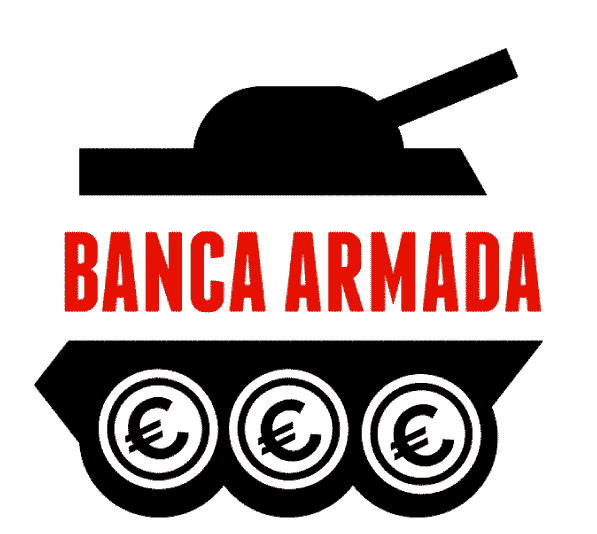Campaign
Finance is of the utmost importance to the military-industrial complex. Arms companies need banking services, both to carry out their daily operations, as well as to get extraordinary funds which allow them to develop new weapons and export them to new markets, and maintain the competitive edge in a sector which is almost entirely. For these reasons, financial support is key for arms manufacturers and others with activities condemned by society as a whole. That is to say, without financing, these companies would be obliged to produce fewer weapons, pollute less, and participate in fewer of the activities that this campaign condemns. The ‘Banca Armada’ campaign condemns the financial institutions which participate in the arms business.


Arms manufacturers can call upon 5 financial tools to support their activities, and the financial institutions investigated by this campaign use at least one of the following:
Financial institutions, when they buy shares in a company which manufactures weaponry, are complicit in thee activities for a variety of reasons. Firstly, because by being a shareholder, one owns part of the company, and is therefore responsible in part for the decisions made by the firm. Secondly, since companies create stocks when they need funding, it finances the arms industry. And thirdly, by buying stocks, one actually raises their value and adds confidence to the company’s ability to generate revenue.
In Spain, arms manufacturers dedicate 30% of their sales to export, and they need financing in order to do this. Financing is needed in these sales, as the governments who import arms usually pay in installments. Without this aid by the banks, the current system of arms exports would be practically impossible.
Bonds and promissory notes are titles emitted by arms manufacturers at a set price, with the promise that at the end of a certain period of time, the buyer will be paid the total value of the bond plus interest. The financial institutions then are dealers in these titles, for which they receive a commission for the profits gained for their services.
Armed investment funds are those in which banks offer stocks of the arms manufacturers. In this way, banks provide funding for arms manufacture, by offering or administrating investment funds in which clients of the bank or savings and loan confide their savings in the hope that fluctuations in stock prices will bring them profits.
The most direct way that banks finance weaponry is in the case of helping arms manufacturers by conceding loans and credits. These are usually granted in through a union of financial institutions, in order to achieve very large sums.
It is important is that every armed bank be considered unethical and should be rejected as an option for people of conscience and in favor of human rights. In this way, the only alternative to the armed banks are the ethical banks, because they promise to wholly agree to certain principles which ensure that financial help will not go to activities which lead to crimes against humanity and violate human rights, as happens with the arms industry.
Alternatives: Ethical banks
“Traditional banks” operate using one basic goal – profit. Ethical banks combine profitability with respect for human rights and the environment. Ethical banks only invest in projects which add value to the society, whether that be social, environmental, cultural, educational, etc, while providing transparency about where client’s funds are invested.
Ethical banks are the seed of a new financial system, one in which we can invest our savings, knowing they will lead to benefits for both investors and society: social, environmental, and economic profits. The association Ethical Financing with Solidarity – or FETS (Finançament Ètic i Solidari) uses 5 principles to measure whether financial institutions are using ethical practices:

Using ethical considerations at every point within the financial institution in terms of investing and loaning funds.
Money must be spent in ways consistent with those same values.
Decision-making must be done in a democratic manner. Not only can members and shareholders vote, but they can also participate in the definition of the basic policies of the institution.
All of the activities and their consequences must be available to the public at regular intervals.
In order to ultimately transform society, financial institutions have to go beyond a criteria of simply eliminating certain unethical investments and define their investment policies in positive terms of what ethical investments are.
These principles must be present in every and each one of the activities of ethical financial institutions.
In Spain, there are ethical banks, credit cooperatives, and associations which promote ethical finance and respond to the principles of solidarity and a social economy. Here are some of the Institutions which are offering an ethical banking alternative in Spain:
- FIARE, Foundation for Investment and Responsible Saving, a Basque bank created in 2003.
- Triodos Bank, an ethical bank with offices all over Europe, which arrived to Spain in 2004
- Coop57, a cooperative with a network-based organizational, growth and development model.
- Enclau, a group in Valencia which works on alternative financing.
- IDEAS, a cooperative in Cordoba which works for social and economic transformation.
- IUNA, a promoter of employment agencies that works to achieve the highest social benefits for all concerned.
- GAP-Madrid, offers financial support by means of solidarity loans to social projects
- Oikocredit, an international cooperative which seeks to disseminate the concept of socially responsible investments.
- FIDEM The International Foundation for Women Entrepreneurs, founded in 1999, has a program of micro-credits for women with no collateral.
Publications and Educational Material
Various reports that delve into the relationship between financial institutions and the arms industry, articles written on the Armed Banking, which highlight the ethical problems generated by the investment of banks in the arms industry and graphic material that has been produced during the campaigns and that has served as a visual support to illustrate the relationships and figures that relate banks and the arms industry.
Database
In this section of the Military Economic Cycle Database, we present data relating to the financing of arms companies by financial institutions identified as armed banks, including the major banks, large insurance companies, investment funds, sovereign wealth funds, pension funds and public institutions around the world.

